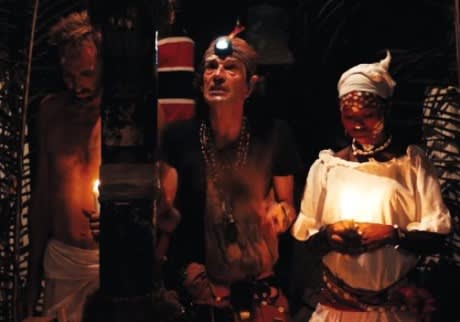A product of naivety, inebriation and youthful hubris, Sick Birds Die Easy is as infuriating as it is impossible to look away from. Nicholas Fackler's chronicle of his search for mystical healing is like watching an intentional train wreck in slow motion.
A better filmmaker could have made a far more formally accomplished and insightful piece out of the material Fackler captured while on a journey to Gabon, Africa (thought to be the actual Garden of Eden) to undergo a ritual purported to cure addiction. But seeing the pretentious young director forced to double-fist sticky doses of reality unfiltered is almost worth suffering through his amateurish cross-fades and drugged-out musings.
Given funding to shoot a documentary in Africa, Fackler decided to take his friendly neighbourhood drug dealer, Ross, and his whiny entitled trust fund prick buddy, Sam to the heart of the Amazon Rainforest to take iboga with a pygmy tribe. Iboga is a powerful hallucinogenic plant native to the region that supposedly kills opiate cravings after inducing an intense three-day trip.
Sam is meant to write a soundtrack to their journey and maybe learn to be less of a prick through a little self-discovery. The rest of the crew – Sam's girlfriend, a sound tech and a camera guy – are all part of Fackler's hard-partying circle of friends. Packing a bunch of LSD, some OxyContin and acquiring more drugs and booze as soon as they hit the ground in Africa, the group obviously have designs on creating a dark odyssey to live through.
Life rises to their irresponsible challenge and the experience these arrogant jackasses go through is a wholly bizarre collision with mortality. Death is not a stranger on their travels and there are legitimately moments when you don't know how this gaggle of stoned urbanites is going to survive in the jungle.
Sick Birds Die Easy is packed with peculiar personalities, such as the Europeans who've adopted the Bweti faith—who are an especially colourful lot—as well as Ross, a classic paranoid cynic who knows what Fackler's after but is initially reluctant to give it to him. And despite being completely pompous in a way that only a young tripper can be, Fackler has accidentally captured an experience made much more profound by the shattering of the presumptuous documentarian's delusions than it would have been had his quest for forgotten knowledge adhered to his derivative and romantic ideas of art.
(Indalo Productions)A better filmmaker could have made a far more formally accomplished and insightful piece out of the material Fackler captured while on a journey to Gabon, Africa (thought to be the actual Garden of Eden) to undergo a ritual purported to cure addiction. But seeing the pretentious young director forced to double-fist sticky doses of reality unfiltered is almost worth suffering through his amateurish cross-fades and drugged-out musings.
Given funding to shoot a documentary in Africa, Fackler decided to take his friendly neighbourhood drug dealer, Ross, and his whiny entitled trust fund prick buddy, Sam to the heart of the Amazon Rainforest to take iboga with a pygmy tribe. Iboga is a powerful hallucinogenic plant native to the region that supposedly kills opiate cravings after inducing an intense three-day trip.
Sam is meant to write a soundtrack to their journey and maybe learn to be less of a prick through a little self-discovery. The rest of the crew – Sam's girlfriend, a sound tech and a camera guy – are all part of Fackler's hard-partying circle of friends. Packing a bunch of LSD, some OxyContin and acquiring more drugs and booze as soon as they hit the ground in Africa, the group obviously have designs on creating a dark odyssey to live through.
Life rises to their irresponsible challenge and the experience these arrogant jackasses go through is a wholly bizarre collision with mortality. Death is not a stranger on their travels and there are legitimately moments when you don't know how this gaggle of stoned urbanites is going to survive in the jungle.
Sick Birds Die Easy is packed with peculiar personalities, such as the Europeans who've adopted the Bweti faith—who are an especially colourful lot—as well as Ross, a classic paranoid cynic who knows what Fackler's after but is initially reluctant to give it to him. And despite being completely pompous in a way that only a young tripper can be, Fackler has accidentally captured an experience made much more profound by the shattering of the presumptuous documentarian's delusions than it would have been had his quest for forgotten knowledge adhered to his derivative and romantic ideas of art.
